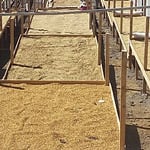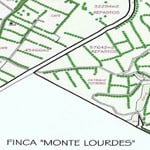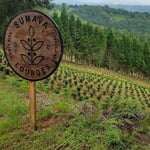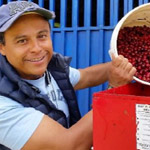About Costa Rica Sumava Villa Sarchi
CLOSEOUT. Still cupping very well.
Arrived October 2022 in grainpro. This was our first offering of this coffee.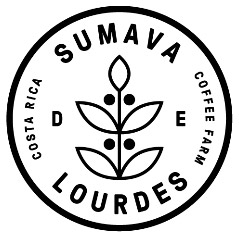
We have an excellent relationship with a person we consider to be Costa Rica's top exporter of specialty coffee and microlots. The exporter has been at the forefront of facilitating small growers to hone their standards which includes full control over the processing of coffee. Over the past few years the exporter, whose partner is an award winning grower, decided to purchase his own coffee operation - Sumava Farm. A few years ago we went to visit our exporter and while cupping coffees at origin in Costa Rica we were wowed by a really impressive natural processed coffee and it turns out it was from his own farm. We weren't surprised to hear that he had won first place at the Cup of Excellence 2016 competition for one of his lots as this is a truly unique and flavorful coffee, the attention to detail and processing really comes through in the cup.
The farm is located in Costa Rica's West Valley Region and in the micro region of Naranjo. There are two plots located on the Sumava Farm, one is called Monte Llano Bonito which is comprised of 9 plots. The other section is 6 plots called Monte Lourdes.The varietals grown on site are Caturra, Pacamara, Geisha, Mokka, and SL28. The farm prides itself on the agronomical practicdes that minimize use of herbicides and pesticides while focusing on using minerals and mountain micro-organisms (MM's) from natural origins instead. When the farm was purchased it was unknown at the time that the property had formerly been a coffee research center of the Costa Rica gorvernment and therefore there were numerous special varieties that had been planted for experimentation.
There are a total of 10 workers on the farm that have access to clean drinking water, electricity, new showers, toilets and social security benefits.
Villa Sarchi is also well-represented on the farm and is ideally suited to Sumava’s high elevation and strong winds. A naturally occurring dwarf mutation of Bourbon, Villa Sarchi likes challenging conditions to reach its full potential (slow growth helps develop sugars). This lot is termed "white honey" processed by the producer which can really be synonymous with washed, as the amount of mucilage remaining on the seed is minimal and is not very impactful in imparting fruitiness, yet is quite clean. The coffee, after passing throught the micromill, is then dried meticulously on raised beds for two weeks – a process that further concentrates fruit flavors and sugars and makes for an exceptional cup.
This extraordinary Villa Sarchi from Sumava has been processed by the Cherry Reposado method, allowing the cherries to rest for a few days after being picked before they are washed. Sumava has developed the reposado method where, immediately following harvest, ripe cherry spends a couple of days of gentle resting time in baskets in the shade. This resting process has made for a complex, clean and bright coffee with fruity sweetness.

Cherries in a "restful" state after harvesting (reposado)

Producer Francisco Mena and family at Sumava
Processing incorporates two aspects of note. Firstly, what the farm terms Reposado is a "restful" period where freshly harvested fully ripe coffee cherries are kept in baskets in full shade for several days (see photo above). Acclimating to ambient conditions adds some depth to flavor and added sweetness as some fruit pulp will begin to concentrate on the seeds within. Secondly, the cherries, after having their outer skin removed (depulped) pass through the micro mill where a fine spray gently removes traces of fruit pulp. When a minimal amount of pulp remains the fruit in this state is placed on drying tables. The seeds, with its minimal fruit still attached is what we would call "washed" but the farm terms White Honey. With this processing combination, the result is a their Reposado White Honey.
Cup characteristics: Marshmallow, earthy, lightly fruity and peppery. Flavors of black raspberry. Very sweet, clean and mildly fruity.
Roasting notes: This coffee is hard and durable, thus it can withstand higher heat and longer roasting times, doing very well to second crack. But do yourself a favor and pull the coffee before the roast dominates; the more delicate flavors will be revealed.


